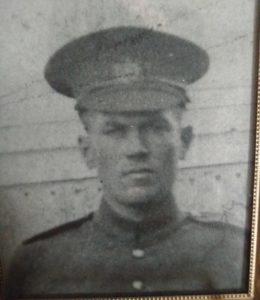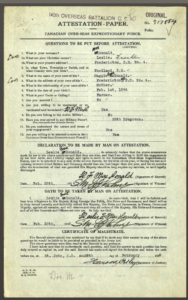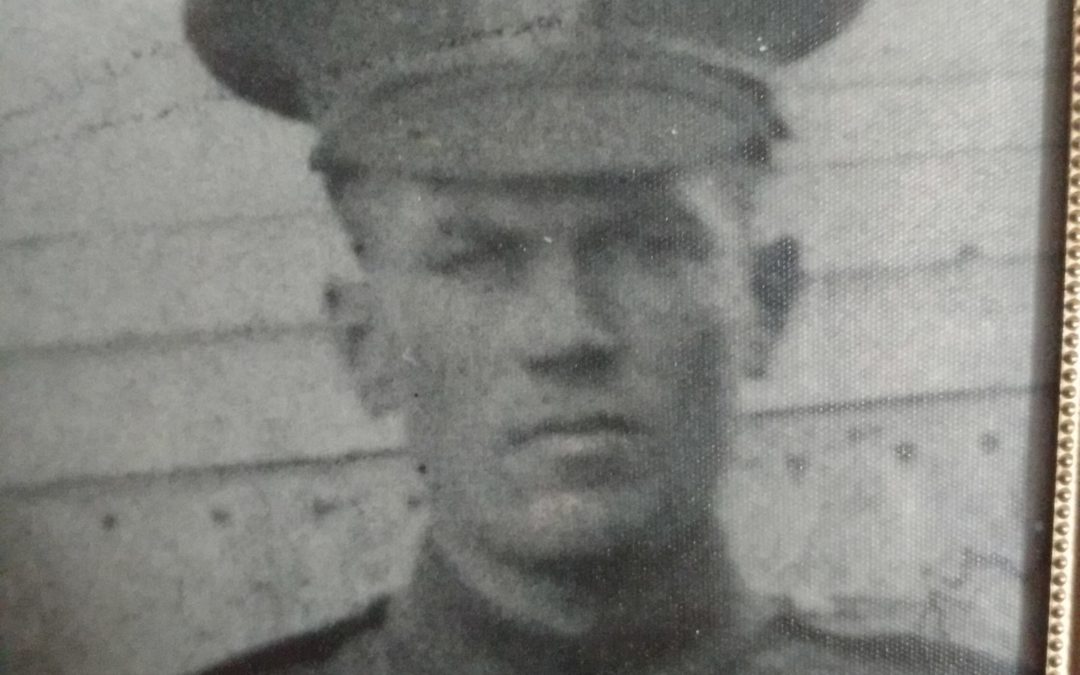
By all reports, Mac was very dashing.
Veteran’s Day is the perfect day to talk about war and family history. My grandfather helped win the war, became a US citizen, and had a large healthy family. But the granular details around these successes rather undo them.
“I’ll kill you, you sonofabit*h!”
My grandfather’s attestation paper refers to him as a “Recruit” – so he must have been drafted. It shows that he entered the military through the Canadian Overseas Expeditionary Forces (CEF) February 28th,1916. He had turned 22 earlier that month, was destined for the front lines, and his CEF papers show that he swore allegiance to Britain’s King George Fifth.
He was assigned to the Royal New Brunswick Regiment, the “140th Overseas Battalion CEF.” The family doesn’t really know all the details, but Mac said he dragged a 50-lb machine gun all over Germany, and someone has his helmet, with a big mortar dent in it! He didn’t talk much about it, but he drank a lot, and with good reason one might say. His kids were reticent to have friends over; he had a reputation.
Mac was home from war and crossing into the US at Houlton, ME, by August 12, 1919, headed for a job in Millinocket, ME. He married my “Nanny” in 1932 and the 1940 census records show he had his first citizenship papers – and his first five kids.

Proof of the Recruit’s oath to the King.
US citizenship would turn out to be the family’s economic undoing. According to family testimony, he never got a military pension from Canada because he surrendered his citizenship, and of course the US didn’t even sign the social security act into existence until August 1935. So Mac and Nanny both worked at physical maintenance jobs well into their old age, just scraping along.
When I spent the night at their house, I slept in the hall, and I could hear him raging, night after night, “I’ll kill you! Take that! God dammit!” I had no idea at all about World War I when i was wee, back in 1970. I thought he was yelling at Nanny, or me! Certainly it was what my friend and business therapist Nicole Lewis-Keeber would call “small t” trauma. But I’m still talking it out with my therapist, my family, and look — I’m writing about it. The effects of World War I still linger for me.
Post Traumatic Stress Disorder (PTSD) emerged as a diagnosis in the 1970s after a wave of Vietnam Vets sought out treatment. We can thank them for that. Mac died in 1976. PTSD was officially recognized by the American Psychiatric Association in 1980.
And 100 years later, many of us are still undoing the effects of war on our families. If you would like to do a project around war and family history, check out my services HERE. Or cut to the chase and book a free call to talk over a project HERE.


 I spent 18 years as “archivist and senior research scholar” at an academic science library, actively trying to add women to the historical record and looking for the women who were already included almost accidentally. I have degrees in women’s history and cultural theory — the latter means that I see the cultural value of everyday practices such as food, clothing, hobbies, and domestic arrangements. Non-famous people matter.
I spent 18 years as “archivist and senior research scholar” at an academic science library, actively trying to add women to the historical record and looking for the women who were already included almost accidentally. I have degrees in women’s history and cultural theory — the latter means that I see the cultural value of everyday practices such as food, clothing, hobbies, and domestic arrangements. Non-famous people matter.